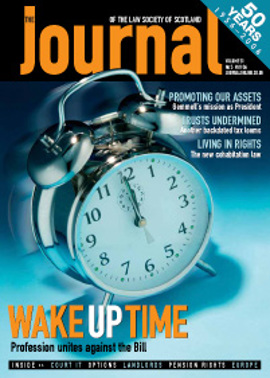A bill to divide us

I regret that it appears to be the general public perception that the current complaints system is not working well. Whilst I do not agree, I share the Council’s pragmatic view that complaints relating to inadequate professional service (“IPS”) should be dealt with by a non-Society body which will be viewed as independent both of the Society and the profession.
Such a body should however also be free of influence/pressure from other outside bodies including the Scottish Executive. I would strongly oppose any attempt to hive off from the Society and the Scottish Solicitors’ Discipline Tribunal consideration of complaints of professional misconduct and I can see no justification for the proposed Commission to have oversight of the Guarantee Fund and the Master Policy. These three areas are hallmarks of the legal profession in Scotland. If removed or compromised, the provision of legal services is likely to become just another business activity, with its practitioners pursuing only the fast buck and not the aims and ideals which brought me into the profession.
The need for regulation is clearly understood and accepted in areas where the public relies on their advisers’ fiduciary duties and professional skills. With solicitors, the public has the benefits of the protections offered by the Society – augmented by the proposals in the bill. However, in relation to legal services provided by non-lawyers (e.g. claims handling, will writing and executry business), the public does not have these protections. It is therefore disappointing that the bill does not take the opportunity to apply a level playing field by extending public protection to those outwith the legal profession who offer legal services.
As an in-house lawyer, I have practical concerns about the manner in which the Commission will be funded and in particular the annual levy which, it would appear, will be payable by all solicitors holding a practising certificate. The practising certificate subscription for most in-house lawyers is met by their employers and such solicitors are not entitled to provide legal services for members of the public – only for their employer. I suspect that many employers will balk at meeting this additional payment, given that it would be unheard of for an employer to deal with any issue of inadequate performance by their employee other than through a disciplinary route.
The in-house sector of the profession is its fastest growing area, now some 27% of those holding practising certificates. From an analysis of what such practitioners do, it is clear that only a limited number of employers employ solicitors to carry out work for which a practising certificate is required. They are valued because of the other skills and qualities which their training develops and enhances. As an example, the Church of Scotland currently employs 11 solicitors, most of whom are entirely engaged in work which does not require a practising certificate. Strictly speaking, the Church could function with only one solicitor holding a practising certificate. The same is likely to apply to other in-house teams, and this could become the practice, thus fragmenting the profession and making the public far more vulnerable than at present to the actions of the unscrupulous provider of legal services – who may have been struck off the roll thanks to the actions of the Law Society of Scotland.
I am proud to be a solicitor. My colleagues and I have been engaged by our in-house clients as solicitors because our clients know they are employing a person who has been vetted by the profession, educated to a sufficient standard and is capable of giving unbiased legal opinion to assist them in the running of their complex and diverse businesses. In-house employers have a range of sanctions for dealing with rogue solicitors and most have sophisticated complaints-handling mechanisms to deal with complaints from the public.
This bill as proposed could lead to the destruction of the legal profession. Why does this matter? Because without a strong profession led by a strong professional body the public will be placed at risk. Solicitors care about their clients; they act professionally; they are harmed by the actions of a very few. Despite the poor public image, the vast majority of clients are pleased with the work carried out by their solicitors.
We need to take care that the law of unintended consequences does not damage the professional heart of Scotland. I would urge all faculties, professional bodies and individual solicitors to explain your position to your local MSPs and fight not just for our profession but for the rights of the people of Scotland as a whole.
In this issue
- Stand up to be counted
- A bill to divide us
- The pendulum swings
- The pendulum swings (1)
- Cohabitation: the new legal landscape
- The tax man cometh (again)
- The foreign legion
- Making IT happen
- Apportioning and sharing
- Property problems
- Still a profession
- Arguing over agreements
- Next generation law
- Lawyers in the transfer market
- Scottish Solicitors' Discipline Tribunal
- Landlords: setting the mark
- Website review
- Book reviews
- Purchase options in leases






